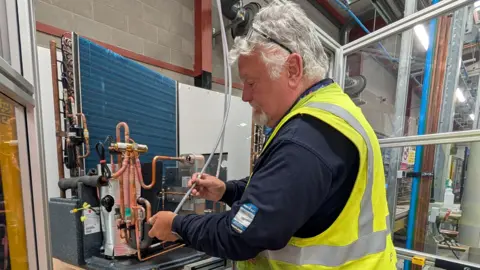The recent surge in awareness regarding climate change has motivated companies like Octopus Energy to take significant strides in the production and installation of heat pumps. On a visit to Octopus Energy’s manufacturing facility in Craigavon, Northern Ireland, the stark contrast between the blistering temperatures in London and the cool atmosphere within the factory became apparent. It was a small respite for employees from southern England who had traveled north, escaping the rising heat attributed to climate change. With evidence suggesting that temperature extremes are becoming more frequent, the push for renewable energy solutions becomes increasingly urgent.
Heat pumps, which are designed to work entirely on electricity rather than fossil fuels like gas or oil, play an essential role in decarbonizing energy systems. Inside the factory, employees like Patrick Doran are gaining expertise in various facets of heat pump manufacturing. Having undergone thorough training in less than a year, Doran now tackles different aspects of the production line, from the intricate fittings of pipes to wiring the internal electronics. His enthusiasm reflects a growing trend in the industry whereby workers are becoming multifaceted through hands-on training and experience, highlighting the importance of skilled labor in the move toward renewable technologies.
As the United Kingdom gears up to meet its energy goals, the government has set an ambitious objective of deploying 600,000 heat pumps annually by 2028. However, the current trajectory shows that the UK is lagging significantly behind, with the total sales of heat pumps barely touching 100,000 by the close of 2024. The demand for these devices saw a spike following the rise in gas prices amid geopolitical tensions, particularly after Russia’s invasion of Ukraine. Yet, as gas prices have slightly eased, that initial enthusiasm has weakened, leading to challenges for heat pump manufacturers in terms of competition with gas boilers, which remain cheaper options for many households.
Octopus Energy has a functional production capacity of 600 heat pumps a month. Anticipated expansion will double this number when they activate an additional production line. The facility can be scaled up significantly depending on demand, which presents an exciting possibility for the company as they prepare for potential surges in interest and sales. Aimee Clark, the head of commercial at Octopus, emphasized the company’s desire to create a plug-and-play solution tailored to fit most UK homes. This unique approach is relatively rare among energy providers, making Octopus’s initiative particularly noteworthy.
The landscape of heat pump manufacturing in the UK is supported by other companies too—entities like Vaillant and Copeland also operate factories within the region, contributing to local production. Understanding the science behind heat pump technology is critical to appreciating its benefits; these systems harness ambient heat from the environment to provide heating inside buildings. A process is used where a refrigerant passes through various stages to absorb heat and transfer it effectively to a home’s heating system.
Octopus’s heat pumps feature a distinctive design encased in dark grey plastic. While the aesthetics may not be particularly inviting, it conceals cutting-edge technology designed to enhance efficiency. The firm has developed unique features, including internal plates to manage heat and enhance performance. This innovation is critical in ensuring the heat pumps operate effectively even as electricity consumption changes.
Despite the promise of heat pumps, successful installation proves crucial. Experts, including academia representatives like Steven Metcalf of the University of Warwick, emphasize that subpar installation can significantly diminish the heat pump’s performance. For a homeowner, this could mean substantial financial ramifications regarding their energy bills. Moreover, public trust in the reliability of heat pumps is paramount, particularly when compared to gas alternatives that have historically dominated the market.
Consumer acceptance varies, and initial investigations indicate that many people using heat pumps find their operational costs comparable if not lower than traditional gas boilers. Notably, there is room for improvement regarding the subsidies available for heat pump installations. Northern Ireland stands out as a region that lacks substantial financial incentives for residents to switch from oil heating systems—an ironic twist given its manufacturing capabilities for heat pumps within the same region.
Ultimately, the dynamics surrounding heat pumps are multifaceted, influenced by market trends, governmental policies, and consumer perceptions. The future of heat pumps in the UK hinges significantly on sustained public enthusiasm, robust policies to encourage adoption, and continuous technological advancements to ensure they provide optimal heating solutions in a changing climate.











